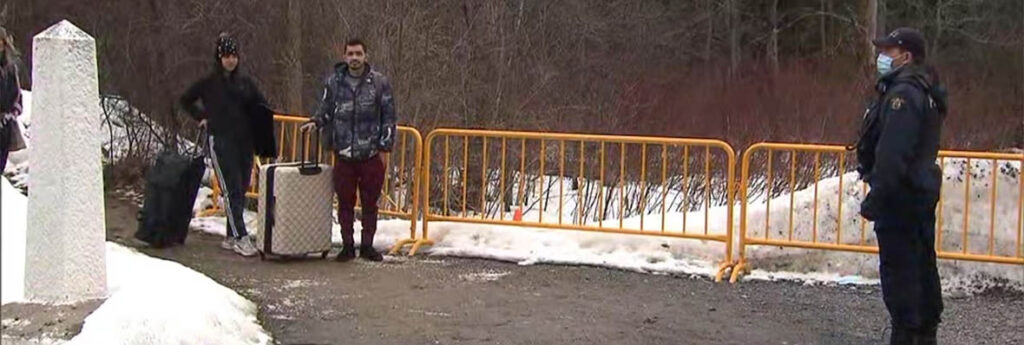Republicans and Democrats in Congress clashed in an escalating political war over irregular immigration in the US. The two sides squared off Tuesday along an unusual and largely unfamiliar front: the 8,900 kilometres of the Canada-US border.
In a subcommittee hearing on Capitol Hill, House Republicans fanned the flames of an emerging fire-and-brimstone narrative about a “metastasizing crisis” of irregular migration along the world’s longest international frontier.
Their Democrat counterparts – helped by Laura Dawson, the Canadian-born executive director of the Future Borders Coalition – did their best to pour cold water on the GOP rhetoric.
“There’s nothing going on with respect to Canada that merits them being treated like some kind of rogue state,” said Rep. Glenn Ivey (D-Md.), the ranking Democrat on the Subcommittee on Oversight, Investigations and Accountability.
In fact, Ivey noted, President Joe Biden and Prime Minister Justin Trudeau met just last week in Ottawa in what he described as a showcase for the healthy state of affairs between Canada and the US
That meeting depicted Canada as “a good working partner with the United States, and that we’ve been able to in the past – and will continue to be able in the future – to work through problems in a way that is joint and effective.”
The numbers are dramatic but dicey
One of those problems, to hear Republicans tell it, is a dramatic increase in recent years in the number of migrants entering the US by slipping over a northern border that is difficult to secure and has gone largely ignored.
Experts dispute the data, noting that not all “encounters” with US authorities involve migrants, and that border hawks often cite the lower-traffic years of the COVID-19 pandemic to make the spike seem more dramatic.
But while they disagree on the scale of the problem, they generally concur that more people are trying to get in via Canada than they were before the pandemic and that the US – in particular, the White House and Homeland Security Secretary Alejandro Mayorkas – should be paying closer attention.
“The Biden administration’s failed policies embolden criminal organizations to exploit the northern border, smuggling people, including children, drugs and weapons,” said subcommittee chairman Dan Bishop (R-N.C.).
“We will hold President Biden and Secretary Mayorkas accountable for this metastasizing crisis.”
Dawson, for years a voice of reason on all Canada-US matters, tried to inject some common sense into the hearing Tuesday, as did Rep. Brian Higgins (D-N.Y.), one of Canada’s more outspoken congressional allies.
‘Not nothing’
When less-consequential incidents are factored out of Customs and Border Protection data, the number of encounters with migrants who slipped into the US between entry points was about 4,500 in the last fiscal year, Dawson said.
“Now this is not nothing, and Canada and the United States must work together to bring these numbers down,” she acknowledged.
“Compared to what most countries are dealing with, the US-Canada border is the envy of the world, but there’s always room for improvement.”
Both Dawson and Higgins cited the new expansion of the Safe Third Country Agreement, confirmed Friday by Biden and Trudeau, as evidence that the two countries are working together on a better solution to irregular migration.
“We cannot characterize our northern border and our northern neighbours as hostile,” Higgins said.
‘An abject disaster’
Dawson and Higgins, however, were outnumbered. Alongside the congressman were three members of the newly formed Northern Border Security Caucus, which has been making political hay out of the issue for nearly a month.
And Dawson was flanked by the president of the union that represents US Border Patrol agents, as well as Andrew Arthur of the Center for Immigration Studies, a think tank widely denounced in Washington as “anti-immigrant.”
Arthur described the new Safe Third Country expansion as “a move that benefits Canada to the detriment of the United States,” noting that some 39,000 people entered from the US last year at the now-blockaded unofficial crossing known as Roxham Road.
“Under this amendment, nearly all such entrants from this point forward will be sent back to the United States,” he said, calling the new agreement a “tacit admission” that US immigration policies “are harming Canada’s security and its taxpayers.”
Not quite the voices of reason
US border security is an “abject disaster,” said New York Rep. Elise Stefanik, one of the most infamous Republican flame-throwers on the subcommittee as she pressed Dawson to debunk a favourite Republican statistic: that northern border encounters have increased more than 800 percent.
“I don’t have the information to agree or disagree,” Dawson replied.
Then there was Rep. Marjorie Taylor Greene of Georgia, who went so far as to suggest that Canada was actively complicit in her country’s immigration troubles.
“It’s extremely concerning and dangerous to the United States of America’s national security that Canada’s immigration policy allows Mexicans to travel to Canada without a visa,” Greene said.
“It seems that Canada wants to participate in Mexico’s invasion of the United States.”
Eh?

